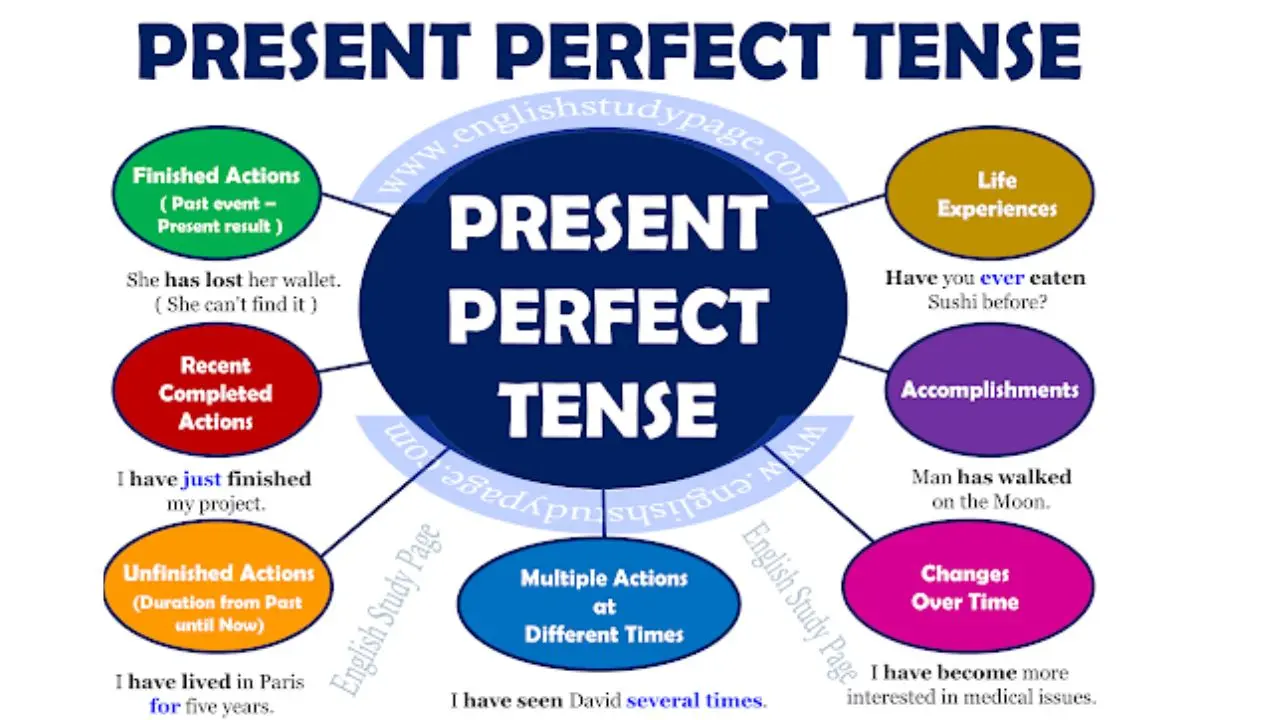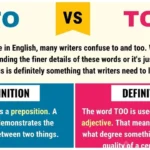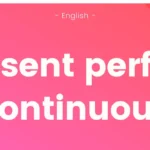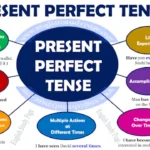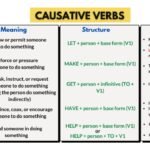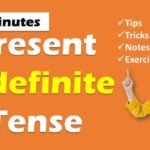Present Perfect Tense: Present Perfect Tense is called “Present Perfect Tense” This tense shows the action which was done before the present time and its relation has gone on till the present time. In this, the effect of the action of the verb is felt till the present time.
It is used in the following situations:
To express the result of an action or event till the present time. An action which has already been completed, but its effect is still being felt.
Examples:
- I have met your friend today.
- She has completed her presentation today.
- They have had lunch together today.
In these sentences, “have” or “has” are used to indicate the past cause or result of the actions, which are still being experienced in the present.
| Singular | Plural |
|---|---|
| i – Have | You – have |
| He – Has | We – have |
| She – Has | They – have |
| It – have | It’s – have |
| Name – has | Names – has |
| This – has | These – have |
| That – has | Those – have |
I:
I have a pet dog.
He:
He has a busy schedule today.
She:
She has a cat.
it
It has a tail.
Name:
Name has a new job. (Here, “Name” would be replaced by an actual name.)
This
This has potential.
That
That has been done.
You
You have a book.
We
We have a plan.
They
They have three children.
It’s
It’s name’s John. (Here, “It’s” is short for “It is.”)
These:
These have different colors.
Those:
Those have wings.
Singular | Plural |
|---|---|
| I: I have a pet dog | You You have a book |
| He : He has a busy schedule today. | We We have a plan. |
| She She has a cat. | They They have three children |
| it It has a tail | It’s It’s name’s John |
| Names Name has a new job (Sita, Gita, Rahul) | Name’s Sita and Gita has a pen |
| This This has potential | These These have different colors |
| That That has been done | Those Those have wings |
Present Perfect Tense
Rules and Uses:
[1.] A present completed action having its effect on present is kept in present perfect tense.
Example:
- She has finished her homework, so now she can go out to play.
- They have cleaned the house, and it looks spotless.
- I have learned how to cook Italian dishes.
- He has lost his keys, and now he can’t get into his house.
- We have seen that movie already.
[2.] If today denotes pasted time for the day is kept in present perfect tense.
Example: He bought a car today. (x) / He has bought a car today. (✓)
- I have met your friend today.
- She has completed her presentation today.
- They have had lunch together today.
- He has received a package today.
- We have visited the museum today.
[3.] Always, Never, Seldom, Often, Rearly, Occasionally, Usually can be used in this tense with completed habitual action.
Example:
- used in this tense with completed habitual action.
- I have always enjoyed reading before bed.
- She has never been to Paris.
- He has rarely missed a day of work.
- They have often traveled to the mountains during summer.
- We have usually celebrated New Year’s Eve at home.
[4.] Just, Just now, Already, So far, Recently, Upper to etc can be used in this tense with completed actions.
Example: He just bought a new. / He has just bought a new car.
- used in this tense with completed actions.
- I have just finished my lunch.
- She has just arrived at the airport.
- They have already booked their tickets.
- We have recently started a new project.
- He has read five books so far this month.
[5.] Last, Past, About, Yesterday, Them, Earlier, Previous, That time, Before, Ago etc are not used in this tense with completed actions they come in past structure.
Example: He has come last night (x) / He came last night. (✓)
- He visited his grandmother last week (✓) / He has visited his grandmother last week(x)
- She ate dinner yesterday (✓) / She has eaten dinner yesterday (x)
- They traveled to Italy about a year ago (✓) / They have traveled to Italy about a year ago (x)
- We saw that movie earlier this month (✓) / We have seen that movie earlier this month (x)
- He graduated from college three years ago (✓) / He has graduated from college three years ago (x)
[6.] Present perfect tense + Since + Past indefinite
Example: Six months have pass since i come here. / I am not singing since i cariar.
- She has been working at this company since she graduated from college.
- They have known each other since they were children.
- He has been a teacher since he completed his training.
- We have been friends since we met at the conference.
[7.] If is/this is + the best/the wars + Present perfect tense
Example: This is the best opportunity i have got in my life.
- the best book I have read in years.
- If is the best gift I have ever received.
- This is the worst day I have had in a long time.
- This is the best opportunity I have encountered.
- If is the worst movie I have seen recently.
[8.] First time, second time, third time, fourth time etc + Present perfect tense
Example: First time i have come here in my life.
- It’s the second time he has won a competition this year.
- She has visited London for the third time.
- We have eaten at this restaurant for the fourth time.
- This is the fifth time they have gone on vacation this year.
[9.] For/since can be used in this tense for a completed action that runs for time.
Example: I have play cricket for two hours today.
- I have played tennis for two hours today.
- She has been studying for her exams for the past month.
- They have lived in this house for ten years.
- We have known each other for over a decade.
- He has worked at the company for five years.
Present Perfect tense in Sentences
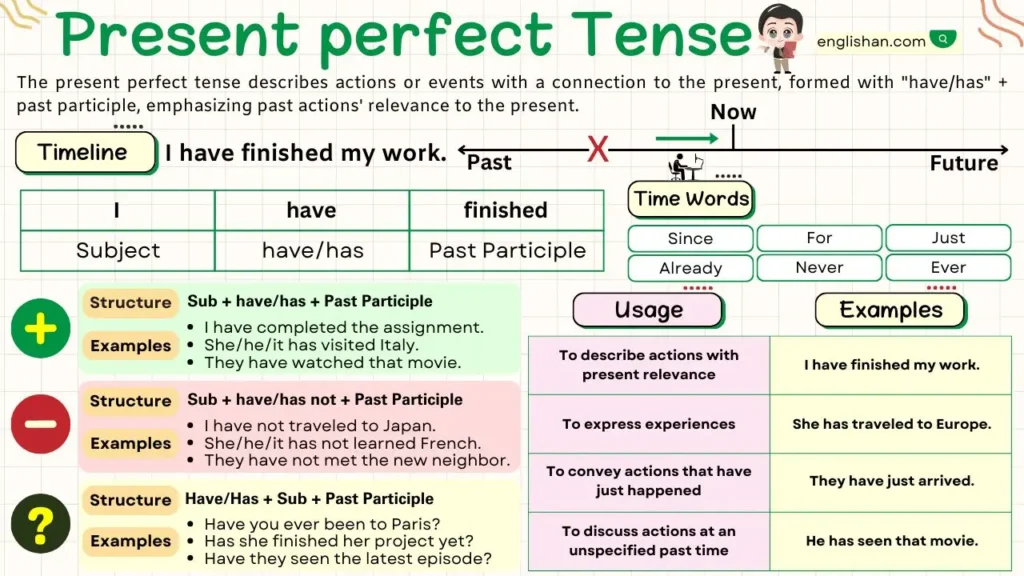
- Affirmative Sentence
- Negative Sentence
- Interrogative Sentence
- Interrogative Negative Sentence
- Exclamatory Sentence
Affirmative Sentence
An affirmative sentence states a fact or provides information in a positive manner using the Present Perfect tense.
Examples:
- She has visited the museum.
- They have finished their homework.
- I have learned a new language.
- He has cooked dinner for everyone.
- We have seen that movie already.
Negative Sentence
Definition: A negative sentence expresses the negation of the action using the Present Perfect tense.
Examples:
- She has not visited the museum.
- They have not finished their homework.
- I have not learned a new language.
- He has not cooked dinner for everyone.
- We have not seen that movie yet.
Interrogative Sentence
Definition: An interrogative sentence asks a question about the action using the Present Perfect tense.
Examples:
- Has she visited the museum?
- Have they finished their homework?
- Have I learned a new language?
- Has he cooked dinner for everyone?
- Have we seen that movie?
Interrogative Negative Sentence
An interrogative negative sentence asks a question in a negative form using the Present Perfect tense.
Examples:
- Has she not visited the museum?
- Have they not finished their homework?
- Have I not learned a new language?
- Has he not cooked dinner for everyone?
- Have we not seen that movie?
Exclamatory Sentence
An exclamatory sentence expresses strong emotion or surprise using the Present Perfect tense. It is often used to highlight the significance of an action.
Examples:
- What a beautiful painting she has made!
- How quickly they have finished the project!
- What a fantastic job he has done!
- How much I have learned from this experience!
- What an incredible journey we have had!
Fill The Blanks With The Correct Answer
- She __________ (complete) her assignment already.
- They __________ (visit) the Eiffel Tower several times.
- I __________ (never/see) such a beautiful sunset before.
- He __________ (finish) his book and is now starting a new one.
- We __________ (not eat) out at a restaurant this month.
- She __________ (just/arrive) at the airport.
- They __________ (live) in this city for over ten years.
- I __________ (be) to that concert twice this year.
- He __________ (call) you three times today.
- We __________ (not hear) any news about the event so far.
Read Also:
